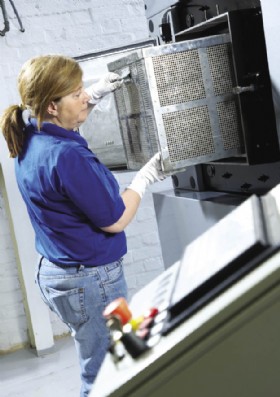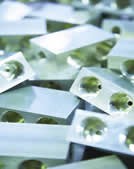BLACK GOES GREEN

The CS300 hermetically-sealed degreaser

With environmental issues moving ever higher up the political agenda, companies are clearly changing their working practices to safeguard their employees’ health and strictly control emissions into the environment. St Neots-based Black Teknigas is a manufacturer and supplier of a highly comprehensive range of gas control equipment and the degreasing of both components and finished assemblies are important operations within the production cycle that impact significantly on the process. Where jointing, welding or brazing is involved, the quality of the finished product would not only be compromised by the presence of residual grease but it could also be hazardous in operation.
Over the past decade or so manufacturing industry has sought to comply with its legal responsibilities with regard to VOCs, and the most visible manifestation of this is the elimination of traditional open top degreasing tanks and even troughs of solvents.
As the technical requirements of Black Teknigas’s customers would not allow for the trichoethylene to be substituted, a detailed evaluation was conducted to find suitable high tech equipment which would allow Black Teknigas to continue to use the substance while complying with the directive. This detailed evaluation of the available equipment led management to choose a CS300 hermetically-sealed degreaser from Italian company AMA Universal. As a specialist in the field with several decades of experience, the company’s surface treatment systems are designed to eliminate different types of potential pollutant, all types of metals and alloys which have been machined with a variety of waxes, oils and emulsified oils. The main characteristic of the machines is the airtight seal of the processing chamber. This, combined with the action of a system of vapour sensors, permits the complete elimination of emissions. There are three steps to the process:
Washing cycle: the system either rotates the basket or the support to facilitate the removal of solid waste and the drying process that follows. This sequential washing method utilises hot-cold-solvent vapour types of solvents which can also allow the possibility of adding an immersion phase that can eventually be combined with a strong mechanical action (forced water-jet drive, ultrasound, etc.).
Drying cycle: this is a closed circuit hot air system with condensation of the solvent vapours through the use of a low temperature refrigeration unit. The reduction of the residual concentration is achieved through an active carbon recycling unit, which is regenerated with hot air (also in a closed circuit system).
Recycling: In order to maintain the maximum purity of the washing liquid that comes into contact with the surface of the parts and guarantee consistent results, a water separation process a filtering process and finally a distilling process.
This system reduces emissions by 98% (in comparison with the traditional open top systems) and reuse of the cleaning solvent makes it a highly sustainable as well as economic method of operation. It is estimated that overall consumption of solvent will be reduced by approximately 80%. All this is fully in line with the company’s policy of controlling all critical manufacturing operations in the interests of quality - a policy that has seen other considerable investment to create an all-in-house production site - and offers a valuable service to third party companies. Since the commissioning the company has also noted significant savings in energy consumption and increases in productivity and an improved working environment.
Dave Martin is Operations Director
with Black Teknigas.
Tel: 01480 407074
www.blackteknigas.com
Published: 25th September 2009
Rachel Wormald, Managing Director at YPS Valves Ltd and Elizabeth Waterman, ...
Are you looking for industry-leading, brand independent valve and actuator ...
As can be seen from the photograph, clearly the resident birds at Bartlett ...
Howco Group has unveiled its latest £1million investment, with the ...
In 2024, Allvalves is poised for an exciting year of growth and expansion, ...
GMM Pfaudler Engineered Plastics & Gaskets are delighted to bring the ...
In the ever-evolving valve industry, GMM Pfaudler stands out for its ...
SAMSON Controls Ltd – part of the SAMSON group - a renowned leader in ...










